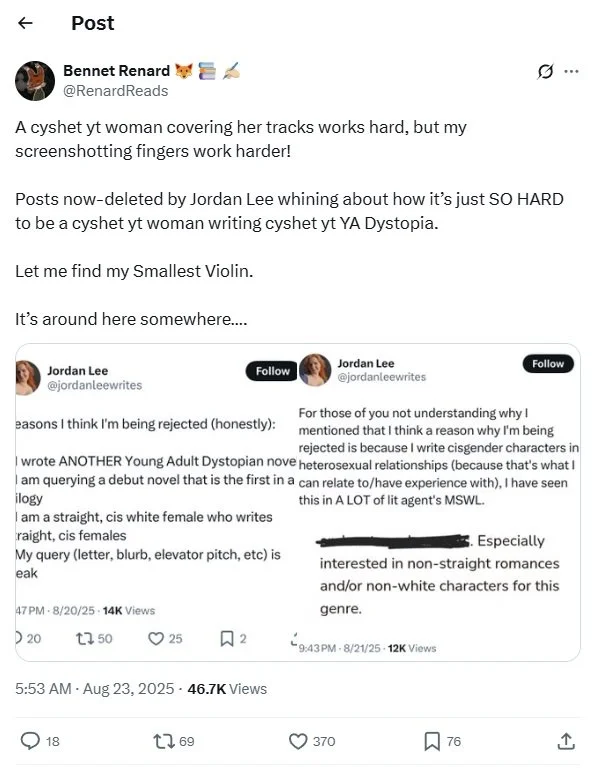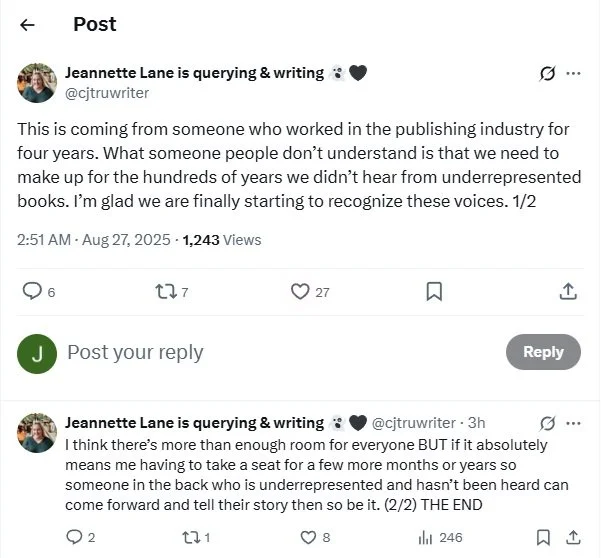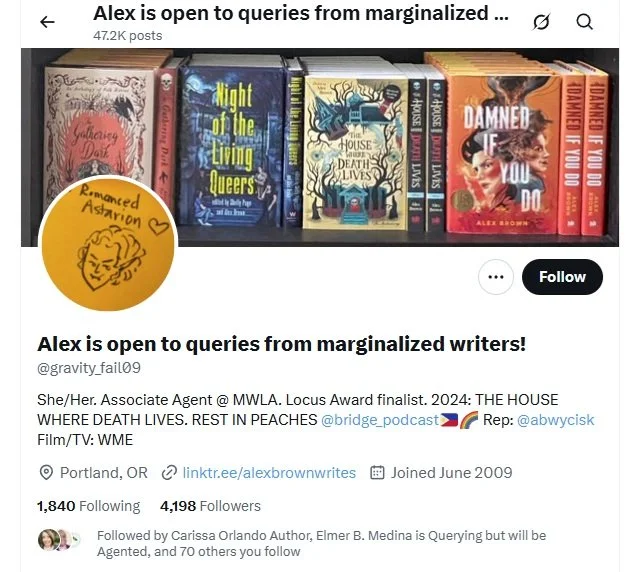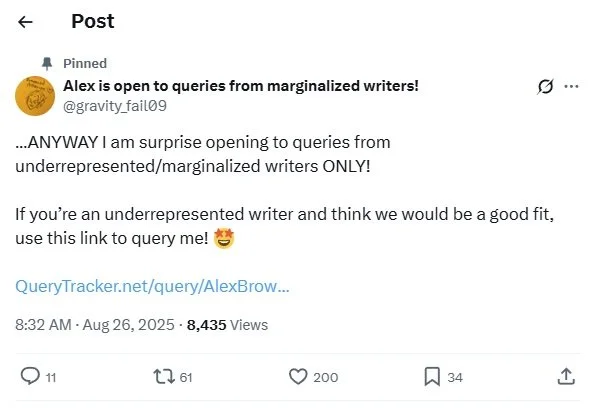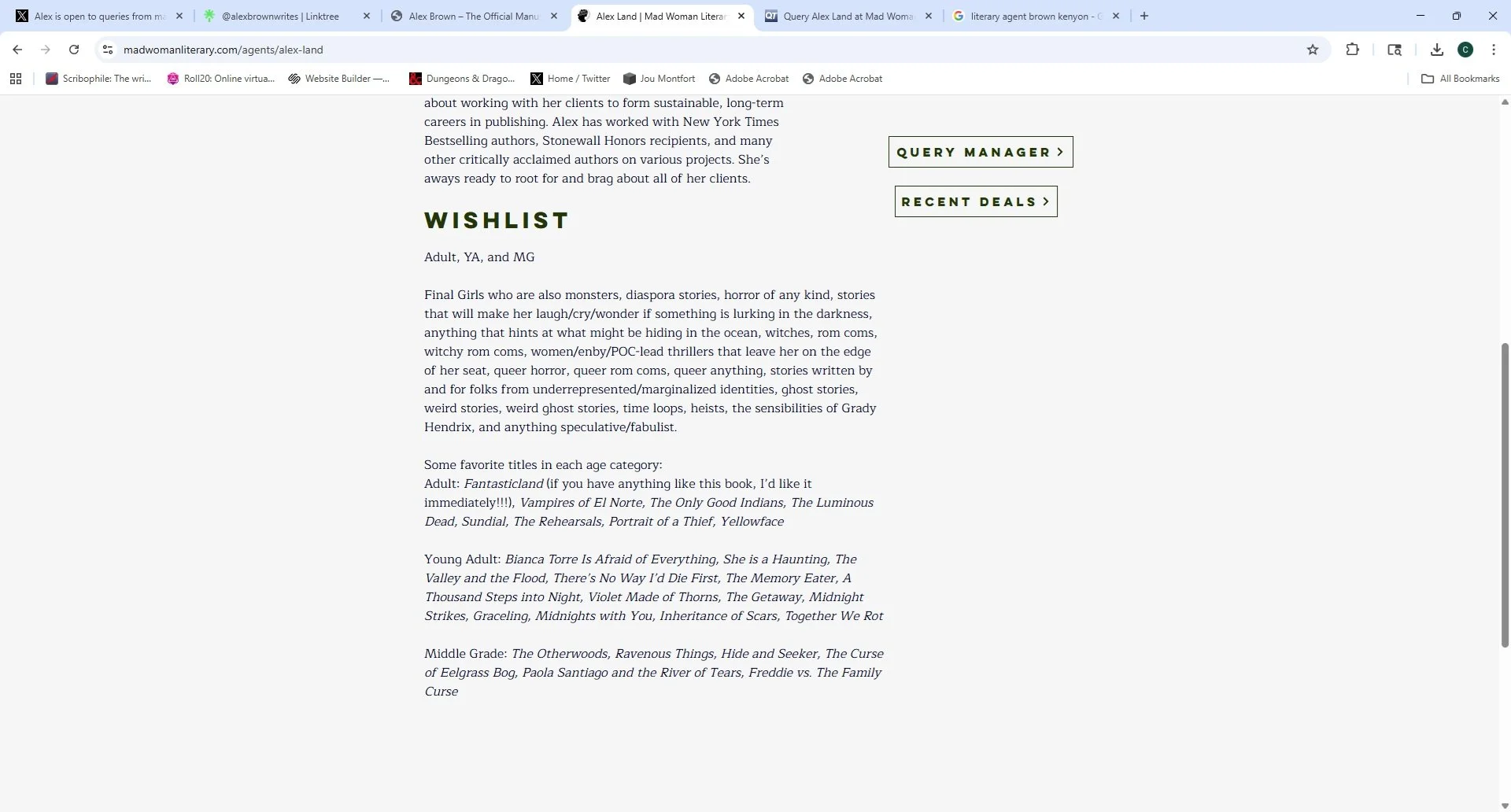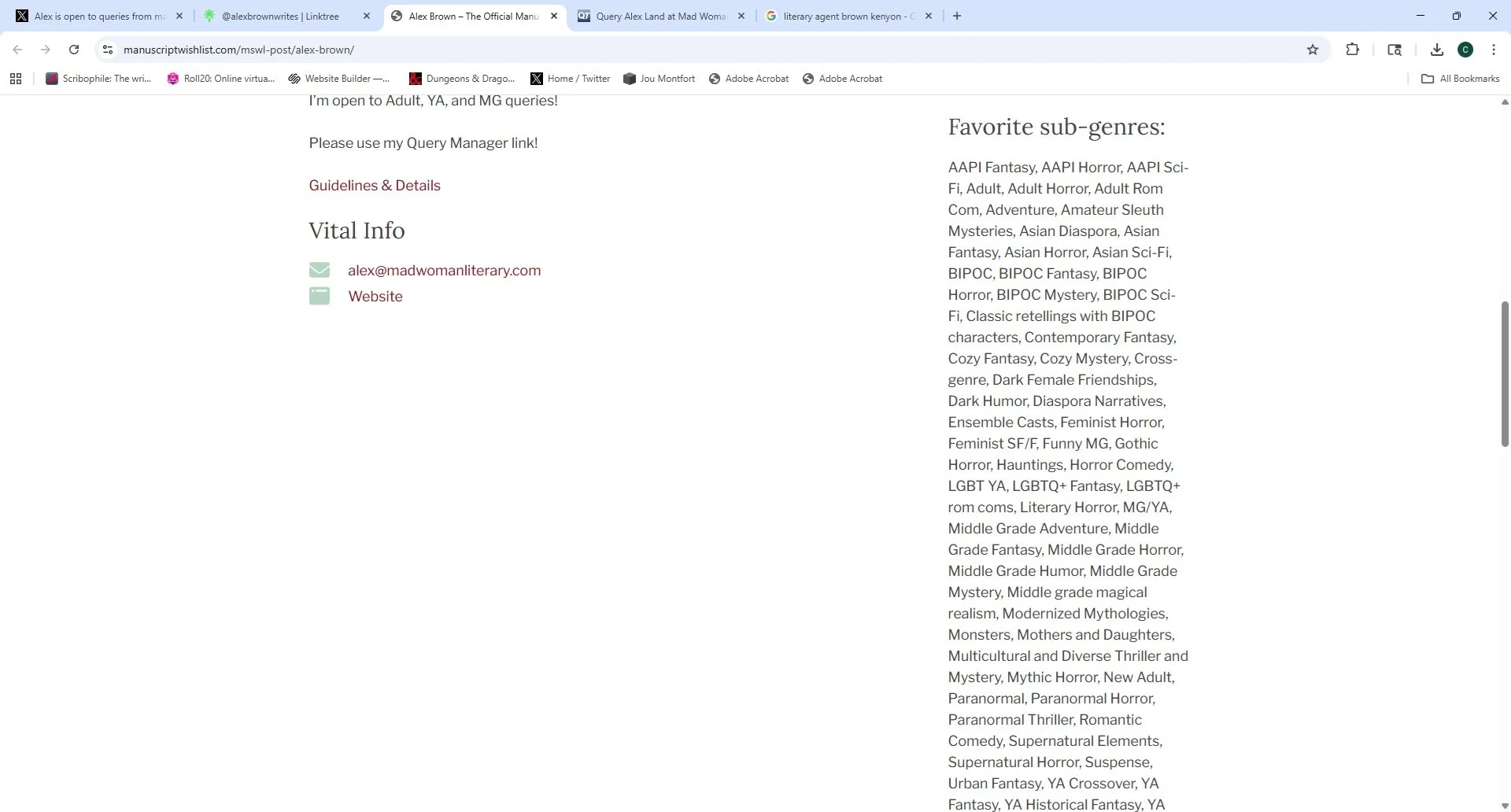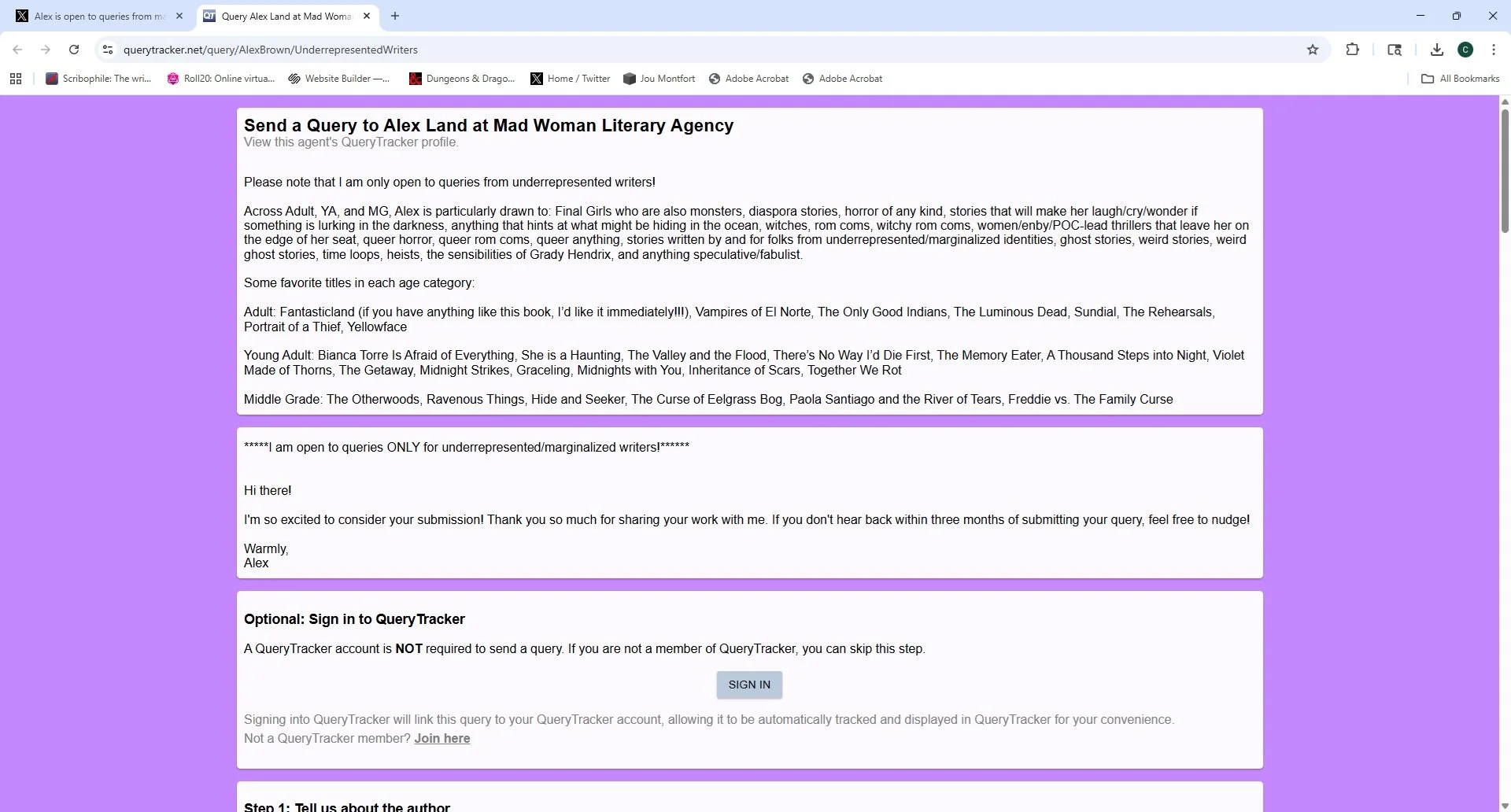Why Do People Think Trad Pub is Biased?
Hello, all. Welcome to this unscheduled response to the latest Twitter storm.
The following interlude is a subject I have long toyed with discussing while making excuses not to do so. The topic does need to be discussed at some point. However, by its very nature makes it very hard to discuss without going against a promise I made in the About section, on account of its socio-political associations. I told myself it wasn’t worth getting into unless something forced it into the spotlight of the literary world.
Well, a recent firestorm in the #BookTwt sphere has pushed things in that direction. I feel I can now at least scratch the surface of this issue without leading this blog astray. We can’t dive deep into the weeds, of course, but we can at least touch upon the aspects that directly face both authors and the audience, similar to what we did with the Romantasy interlude.
If you’re just here for book reviews, don't worry - Friday’s review (Onyx Storm, Chapters 33 through 37) has not been displaced. It is already scheduled and ready to go. You won't miss anything important if you choose to skip this commentary and wait for Friday.
If you’ll indulge me, though, let’s dive into the inferno.
DISCLAIMER
I’m going to be using a lot of screenshots of Tweets for this one. This is protected under Fair Use for both Twitter and the United States, not to mention the exemptions outlined in Japanese copyright law, as these constitute a form of factual reporting and it being used in a transformative manner for this analysis. I’m spelling this out in advance because I’m referencing a lot of Tweets here, and I don’t feel like needing to argue with every person who might not appreciate a record of their posts being preserved in a location where they can’t delete it.
THE STORM
On August 20th, an aspiring author named Jordan Lee published a “Reason I Think I’m Being Rejected (Honestly)” list on her Twitter, expounding upon why she thinks she has not been accepted by traditional publishing outlets (“trad-pub”) for publication.
You’ve probably gathered by now that I’m not a fan of this sort of behavior. It’s a self-indulgent cry for attention. I was prepared to ignore it.
Twitter wasn’t. Half my feed has been swept up by the resulting firestorm. And as I scrolled past these hastily typed hot takes, the source of this firestorm has caught my attention.
Lee’s original Tweet has deleted. However, one Bennet Renard, proud owner of a pair of hardworking “screenshotting fingers”, was able to grab both the Tweet itself and one of the follow-up comments for us.
Why are people upset about this?
Autopsy
Three of the four reasons Lee gave are honest assessments of why her book might not be marketable. She admitted to flawed decisions, if not outright weakness. She took responsibility.
As for that point blaming other people … normally, I absolutely would file this way alongside Goodwin blaming “trolls”, “arseholes, and the “pro-Palestine lobby”, except Lee clarified what she meant by that.
What Lee is calling out is fact that agents and editors openly advertise a preference for literature based on identity politics rather than merit or marketability. They announce a bias to the world, and she decided to take them at their word. She even provided an example (though, by redacting part of it, she has made it impossible for people to check her work). It’s really not hard to find other examples, though. Here’s one I pulled from Olswanger Literary, the very first agency I checked:
“Prioritizing writers from minority groups” means “placing the race and sexual orientation of the writer about the quality and marketability of the writing”. This example is actually worse than the one Lee used. At least Lee’s example could be written off as a matter of interpretation. This is someone openly declaring that professional decisions will be made based upon a prejudice for inalterable traits.
Why are people so upset at Lee, then? It can't just be because she threw a pity party. Lots of people do that on Twitter. You have to go above and beyond, the way Goodwin did, for a pity party to provoke this kind of response. And Lee isn't lying, especially when it is this easy to corroborate her story. What, then, did Lee do to offend all these people?
Well, let’s zoom out on that post where Bennet Renard provided us with the screenshots, shall we?
Ah. So it’s about defending identity politics. A rather spiteful brand of identify politics, at that.
There are variations of this across Twitter. Countless writers are mocking Lee mercilessly. The posts that don’t focus on the identity politics angle mock her for not taking accountability for the quality of her own work - ignoring the fact that three of the four reasons on her list did just that. Most make no attempt to engage with her point about biases in the industry or with the evidence she provided.
When efforts are made to counter the accusation of identity politics-based biases in trad-pub, it takes one of five forms:
Accusing her of being a racist, neo-Nazi, radical, far-right, or generally evil.
Insisting that being in a favored demographics does not guarantee success.
Strawmanning Lee’s position as an attack on “minorities”.
Insisting that there is no bias, while doing nothing to address the example given.
Saying, “Yes, the bias is exists, and that’s a good thing!” See this charming post by Jeannette Lane as an example.
This has lead to an effort to cancel Lee, which triggering a pushback by people sick of cancel culture, which in turn is spinning into wider outrage that frankly departs from what I’m willing to analyze here.
THE REAL QUESTION
I’m not actually here to address whether trad-pub is indeed biased against people based on race, sexual orientation, sex, or gender identity (or any other group identifier). You can find plenty of other people who are prepared to break that down. Even if you are certain that there is no bias, I hope you will approach this with an open mind, as I feel there is a problem that exist regardless of whether or not the bias itself does.
You see, the trad-pub industry - and, by extension, all the Twitter personalities who rabidly defend its decisions - are creating and sustaining the PERCEPTION of bias, and this effort to punish Lee for pointing that out only serves to deepen the issue.
A WILLING OFFERING
I thought I was going to have to scrape the bowels of the Internet for a worthy example. However, by the grace of God, a ram chose this moment to jam its horns into the brush and offer itself for the altar.
Allow me to introduce you to Alex Brown, a proud member of the Mad Woman Literary Agency, and her Twitter page.
Like most agents and editors these days, Brown treats her personal Twitter profile as a professional page. This profile is therefore an extension of Mad Woman Literary Agency. Unless and until they crack down on her and publicly disown what she posts, anything she says on her Twitter is an official statement made on behalf of the agency.
On the afternoon of August 25th (morning of the 26th for me), Alex delivered this gem.
What does “underrepresented / marginalized” actually mean?
Whatever racial, sexual, or ideological demographic the user of the term (in this case, Brown) wants to paint as inherently more deserving.
Usually, the list includes:
Anyone of Asian descent
Anyone of Hispanic descent
Women
Anyone of Native American / other “indigenous” descent
Anyone of sub-Saharan African (“black”) descent
Anyone with darker skin (i.e. people who could be called victims of “colorism” perpetrated by other members of their general racial group)
Anyone who can be branded as an immigrant or refugee, provided that they fit into one of the above categories and are settling into a Western nation (sorry, you Western expats in Japan. You do not qualify).
Non-heterosexuals
Transexual people
Transgender / non-binary people
Now, I say “usually” because this list varies heavily on context. I also organized it the way that I did because there is an unofficial hierarchy of marginalization. It’s exposed by the sides that end of demonized when two of more of these demographics come into conflict. Asian or Hispanic people don’t count if they are perceived as more privileged than black people. A heterosexual woman is valued less than a homosexual man, who in turn is less valued that anyone transgender. I didn't even bother putting disability on the list, because while it is often trumpeted as an underrepresented identity, it's wholly subject to whether someone checks the other boxes. Jewish or Muslim people likewise only really apply on a case-by-case basis.
The Hypocrisy
Brown isn't announcing that she is going to evaluate each individual writer’s based upon the merits of his or her work and maybe, just maybe, on whether there’s a personal life story that could be marketed. She is openly declaring that she will reject anyone who falls outside of the demographics she has arbitrarily decided to be more deserving on the basis of inherent characteristics. This is a modern version of an “Irish need not apply” sign on an apartment building with vacancies.
It is, in a word, bigotry.
This representative of trad-pub has gone out of her way to prove Lee correct. She is reacting to someone concerned about being excluded for inherent traits and announcing, “Hey, everyone! I am going to exclude people for their inherent traits!”
Actually, it’s worse than that. This isn’t just bigotry against the people being excluded. It's also bigoted against “underrepresented / marginalized” people. By limiting her representation to her Chosen Ones, Brown implies that they inherently less capable than the people she excludes. She cannot conceive a situation in which she represents a member of these demographics unless she excludes all other options.
PERCEPTION
I should be able to write Brown off as an anomaly. One bad apple does not equate to systemic bias. Not even dozens of bad apples would equate to that. Bad actors exist everywhere, and it would be wrong to condemn am entire industry because of them.
In fact, there is a very easy way for trad-pub community (both industry members and their supporters) to prove Lee wrong: make an example of Brown.
Mad Woman Literary Agency could order her to take down this post and release a statement reaffirming their commitment to equal treatment for all.
The trad-pub industry could condemn such language and advocate for an end to agents announcing their biases (since, after all, if the bias does not exist, there should be nothing worthwhile to gain by making people think that it does).
The people who do self-righteously try to cancel Lee for calling out this behavior, who dismissed her take as evil, could unleash their wrath on Brown instead.
Any of these things could happen.
I have no faith that any of them will.
Mad Woman Literary Agency
Brown isn't just posting this prejudice on her Twitter. This isn't just a case of someone destroying any separation between their personal social media and their professional lives. It’s on the MWLA website, where Brown treats the identity as a characteristic of her preferred genre.
It’s on her MSWL, where again, she treats identity as a genre.
It’s on her QueryTracker, where she loudly reaffirms her devotion to excluding people based on demographic in the very first line of her introduction.
I was prepared to give Danielle Burby, the founder of MWLA, the benefit of the doubt and assume she doesn't keep a close eye on her employees … but given how she uses identity politics in her mission statement, it seems like she endorses this behavior, even if she is not actively aware of it.
Does MWLA as a whole have a bias in which they apply identity-based discrimination to screen authors?
Well, I have no evidence to say for certain. What we do have is enough for the perception that they do. That’s all that’s necessary to word people and cause frustration to build.
Industry
Brown’s behavior is not isolated. Trad-pub has indulged in this sort of thing for years. It is a natural progression of their efforts to virtue signal.
You see, that example Lee gave is not atypical. Most literary agencies in the English-speaking West have at least one agent whose profile or MSWL includes some variation of, “I support diversity,” or, “I want more diverse stories”. The ones who emphasize the specific identities they favor are also very common. Some also treat identity as a trope, seeking things like “BIPOC representation”, “sapphic romance”, and “feminine / indigenous rage”.
Let’s say that all of this is just virtue signaling. Let’s assume that every single one of these agents really does put merit first, and that there is no meaningful, statistical difference between the demographics of people represented by these agents and the demographics represented by agents who don’t do this. There are still three huge problems here.
Making the virtue signal implies that anyone who does not make this signal is against diversity. In other words, it is an open-ended accusation that the rest of the industry is prejudiced, without providing anything to support that assertion.
It tells querying writers that identity will be evaluated at least as strongly as prose, tropes, or anything else the agent chose to list. After all, why say this at all unless this affects the decision-making process? I can somewhat understand mentioning a passion for advancing these causes if it’s limited to a personal bio, but associating it with any sort of wish list makes it seem like a deciding factor.
Once enough people do this, it waters down the virtue signal, forcing more extreme behavior to maintain the illusion of virtue. Brown is not the first example I’ve seen of this sort of behavior. Plenty of agents have announced these exclusionary query windows on Twitter. Amanda Carbonell of the Belcastro Agency jumped on the bandwagon a mere 24 hours about Brown. I even remember coming across an agent about a year ago who outright stated that she refused to work with white authors as a rule. (I wish I could screenshot her agent profile, but by this point, I’ve forgotten the name of both her and the agency.)
All this is to say that, at best, trad-pub’s desperation to virtue signal their support for diversity is having the opposite effect. It is broadcasting to outsiders that there’s a bias. It doesn't matter at this point if one actually exists. By making identity a box to be checked or by explicitly excluding people, these agents are creating the impression that it is a systemic issue, thereby causing the frustrations the Lee and many others have.
At worst, agents are so comfortable with their personal prejudice, so secure in the lack of consequences from the wider industry, that they are getting brazen about it.
Community
The backlash to Lee pointing out the obvious is not exactly what I would call rational (particularly the recent rambling about her being a neo-Nazi). I will get into those five major arguments shortly. For now, I’m just going to point out that this fanatical response creates a feedback loop. Bad actors in the industry see this behavior, are emboldened by it, and advance to more extreme behaviors. Brown’s post does seem rather conveniently timed; Carbonell’s is even more so.
The perception of prejudice that festers in the trad-pub industry is allowed to continue because we reward the behaviors that created it in the first place.
Counterpoints
In the interest of fairness, let’s go over those five main arguments I saw used to try to drown Lee out.
Lee (and those who agree with her) are racist / neo-Nazis / bigots / far-right / evil.
No meaningful evidence is being provided. Remember, the post I retrieved the screenshots from what critical of Lee, and even that failed to provide evidence to support this conclusion.
All this name-calling amounts to is, “This person disagrees with me, therefore, this person is evil.” This is a bad argument.
At best, it is self-defeating. The umbrella of Diversity includes people and practices who have, historically, also been branded as evil … which means that the people defending it can be damned as evil by association … which means the people making this argument are also evil. This mud can be slung both ways. This is a pointless game to play if you don’t have a higher power to back you up and assert via divine will that there is a fundamental divide between you and the people you are accusing. The people making these accusations are not collectively invoking God, so this conditional doesn’t apply.
At worst … this is an excuse to hurt people. After all, any action taken against evil is definitionally good. Alienating Lee and others who agree with her is an excuse to indulge any number of horrific urges without feeling any guilt.
Privilege does not guarantee success.
While skimming through responses, I saw a post by a writer who identified as a black woman. She argued that, even if agents were favoring people based on identity, that would not guarantee success. She has still earned her place because she worked hard and faced multiple rejections.
Okay. Let's apply this logic consistently.
Let’s say the year is 1950. One hundred men are competing for ten jobs. Thirty of these men are white, while seventy are black.
Eight of those ten jobs state that they welcome white applicants or will prioritize white applicants. One explicitly bans black applicants. One is open to all.
White men claim all ten of the jobs.
So … to everyone who thinks that bias in trad-pub doesn’t matter even if it does exist … would you also say that there was no prejudice on display in this hypothetical, that these white men unambiguously were the best candidates for the jobs and earned their positions fairly, and/or that they were more qualified than all seventy of those black men? After all, just because these employers stated a racial preference and made decisions in accordance with that racial preference, that doesn’t mean that they applied racist thinking to their decision-making process. Even if they did, those white men worked very hard. Being one of thirty men fighting over nine jobs is a daunting prospect.
No? You would assume racism? You would not ignore that just because the white men had to compete against each other?
Then be consistent. If trad-pub advertises a bias, we need to ask serious questions about whether the people they end up accepting were truly chosen on merit, particularly if the chosen people are within the demographic benefiting from the bias.
Strawmanning Lee’s position as an attack on “minorities”.
Uh … no. Acknowledging that people are being excluded is not an attack on the included. If anything, excluding people is an attack in the excluded. If the push were to cut “minorities” out of publishing entirely, that would be another matter, but we would need to pass through a state of equal treatment before we reached that opposite extreme.
Put another way: to those in a position of privilege, equality of treatment seems like oppression.
Insisting that there is no bias while ignoring the evidence.
This was limp to start with, but I’ve already provided more damning evidence than Lee did, so I feel like continuing this track would be pointless.
Saying, “Yes, the bias is exists, and that’s a good thing!”
Acting like prejudice against a group of people is a good thing because of events that happened before they were born is ludicrous. The same applies to granting people special privileges because, at some point before they were born, people like them were victims (or, at least, are now interpreted as victims). Every person who truly cares about diversity should condemn this rhetoric, as it has been the foundation for prejudice, oppression, and outright genocide across history. It doesn't suddenly become righteous because you need to virtue signal.
At this point, the single most important people can do to help diversity in trad-pub is to let everyone succeed or fail based on merit, rather than playing favorites. Let all stories compete in a level playing field. The stories that deserve to be told should rise to the top on their own. Denying that equal opportunity, playing favorites, just creates a new privileged class, one stained by hypocrisy.
RECEPTION
The Querying Author
Imagine, if you would, that you have been trying to write since you were seven.
Those first 10 years of labor were obviously amateurish. You lacked skill, dedication, and the necessary cognitive development to fully community your ideas. Still, you grew. You improved. After another 10 years, you finally were ready to start submitting to agents.
It went poorly, of course. Your writing was still terrible. Agents did not hold back. Their feedback was hardly detailed, of course, but they still were quick to point out things like a clichéd opening, a failure to establish place or plot, poor character work, or bland prose.
So you went back to the drawing board. You learned. You improved.
Then you came back three years later and tried again - and that’s when you noticed something odd. A lot of these agents are emphasizing that they want writers whose inalterable traits aren’t the same as yours. Suddenly, your writing is not the only criteria.
“But that’s just virtue signaling,” you told yourself. “Surely, the quality of my work will shine through.”
It did - and it didn't. You still got rejected. However, now, almost none of the agents provide feedback. Among the ones who virtue signaled, there is no feedback at all.
“I guess I need to move onto the next project. I need to keep working and improving. Maybe that will get better results.”
Except, when you come back, the exact same thing happens, except now you had to wade through even more virtue signaling.
And the time after that, a few years later, there is yet more virtue signaling.
You know your writing isn’t perfect. Surely, there will be agents with something negative to say. Surely, they will give you direction on how to improve.
But there is nothing. The agents speak of passion. They speak of looking for other things. They say nothing about your work not being marketable or not being good enough, even when you admit to yourself that your project is too niche.
“Why aren’t they passionate?” you ask yourself. “I checked the boxes for all the tropes they said they wanted. What did I miss?”
So you look back … and you realize that you didn’t check ALL their boxes.
You did not check the boxes for identity.
And the agents keep insisting that identity matters. In their social media, they advocate for prioritizing writers based on identity rather than merit. They begin explicitly excluding people who share your traits.
You soldier on. You tell yourself that you just have to keep improving. You tell yourself that it’s purely a matter of skill.
But you read the books that are coming out, and you notice the drop in quality. It’s to a point where, despite your past refusal to say you could do better than others, you start to think that maybe you could do better. Your rough drafts begin reading more coherently than these polished, professionally edited works. You also can’t ignore how these authors who are producing inferior works all check one or more of the identity boxes that you cannot, especially when they themselves virtue signal about that fact.
All the while, agents get more and more assertive about how these authors who are writing bad books are inherently more deserving because of skin color, sex, or sexual orientation.
Is trad-pub prejudiced against you?
“I don’t want to think so,” you say. “I want to keep the focus on my own weaknesses and capacity to improve. The thing is, trad-pub keeps insisting that they are.”
The Audience
An uncomfortable question needs to be asked:
How many bad books are being published on the basis of this bias that is being virtue-signaled about? How many debuts are being made based on factors other than the quality of the writing? How many writers are getting pushed into bookstores before they’re ready because their agent or acquisitions editor wanted to virtue signal?
Let's consider all of the books that Recent Reads has reviewed thus far. Disregarding the indie books (which, obviously, did not go through trad-pub, so we can’t blame trad-pub for them), what pattern is on display among the author / books rated less than 5.5/10?
(There were two books that got multiple ratings based on target audience and ended up straddling this line. I am going to go with the rating most relevant to the conditions under which these books were released, so one will end up on this list while the other won’t.)
Notorious Sorcerer was a debut novel written by a woman. It is yuri erotica, so it ticks the LGBTQ+ identity box while also appealing to the agent / editor bias for porn (another publicly trumpeted bias).
Son of the Storm was the debut novel of a black man, who including virtue signals about identity politics (among other low-hanging fruit that is popular in trad-pub) in the book.
The City of Brass was the debut novel of a Muslim convert who was very vocal about identity politics in her marketing.
The books of The Empyrean are from a well-established (albeit midlist) woman who exploited existing industry connections and her publisher’s desire for Romantasy.
A Master of Djinn was the debut novel of a black man who is vocal about identity politics within both the book itself and on his blog.
Murtagh was a book written by an established author to capitalize on a bestselling series with an established audience.
The Eye of Minds was written by an established author whose previous bestselling series was adapted into a series of films.
The Hero of Numbani was a tie-in novel, so its publication should be taken as a given. However, the choice of author - a woman of the same race as the main character (whois black), whose only previous work seems to be novels that tick both the BIPOC and sapphic romance boxes - was not a given. That was a choice made by a trad-pub entity.
So … we have two cases of books that should have been guaranteed successes, two people writing porn …
… and four writers who tick one or more identity boxes. They support or outright preach trad-pub’s prevailing ideology, too, but ideology is not pushed as openly or heavily as identity when it comes to what the industry is looking for.
Also, three of those four writers make up three of the four debuts. The fourth writer debuted with content that checks other identity boxes, while the last of the debuts that’s actually on this list was Representation for LGBTQ+.
Bear in mind that, unlike some people on Twitter, I do not choose authors on the basis of identity. I prioritize a good story above such things. If anything, I veer away from anything that openly markets on the basis of identity, since that sort of thing tends to promise lower standards and higher chances of preaching. So for trad-pub to still deliver these statistics, I’m either the unluckiest person alive, or else they have a bias that is now backfiring.
I should not have to bring this up. The pattern should not be worth commenting upon. I should be able to look at this bad books, shrug, and idly wonder what trad-pub saw in them before wandering off and forgetting I ever read them.
Trad-pub has chosen to tell us exactly what it sees in these authors. They want to be praised for the perception of bias. Now, as the cases of Brown and Carbonell show, there are even agents who explicitly want to exclude people who do not satisfy their bias, thereby removing competition that might otherwise keep bad (or, at least, not yet ready) writers form being published. They want to be praised for shoving said writers into the spotlight prematurely.
Something that I covered in my Romantasy interlude is that the world of literature, like all art, is full of trash. True masterpieces are always rare. However, when trad-pub trumpets that bias will be held above merit, and then trash is published, then by the transitive property, the trash exists because of the bias.
And if the bias truly does not exist, then that isn’t just tragic. It’s cruel. Agents are preemptively heaping the blame for their failures onto the “underrepresented / marginalized” people they claim to be advocating for.
THE SOLUTION
If these is truly no bias in trad-pub, then I have a revolutionary idea for how the industry can lay this matter to rest.
STOP.
VIRTUE.
SIGNALLING.
Oh, and while you’re at it, hold your agents accountable when they broadcast the air of naked prejudice Brown and Carbonell are laying down.
It really is that easy. The trad-pub industry is the one pouring fuel on this fire. Most of the evidence that people outside of the industry have about bias are things coming out of the mouths of trad-pub agents. Without that unrelenting testimony, complaints of bias would shrivel, with nothing to support them except statistics and whispers from industry insiders. In fact, there may not even be statistics at that point. For example, if the data being presented by Ann Glimmer is to be believed (and I don’t have the time or resources to fact-check her properly, so I’m going to say for the sake of argument that the data is correct and that she is representing things 100% accurately), there is evidence to indicate the all this virtue signaling about diversity truly is just virtue signaling.
Not shouting to the rooftops that you want people from specific demographics is not the same thing as excluding those demographics. Quite the opposite. By not highlighting groups of people as inherently more desirable, you will eliminate a key source of doubt as to whether any of the bad authors in the bunch are only getting published because of their identity. You will leave merit (or, in the case of bad books, an error in the judgment from trad-pub) as the most logical explanation for how they got into bookstores.
Besides - as the movement towards openly exclusionary behavior shows, the virtue signal has worn thin. It’s getting to a point where more and more members of the industry will need to embrace open prejudice to stand out anymore. Now’s the time to back off, before any doubt about bias is erased.
Which would trad-pub prefer: that “underrepresented / marginalized” people end up being perceives as the new elite who profits from prejudice? Or that all writers be treated equally while the best stories (including those by “underrepresented / marginalized” people) are celebrated for their own merits?
BACK TO BUSINESS
Thank you all for joining me for this little interlude. I realize my analysis will not single-handedly lay this matter to rest, nor do I expect everyone to wholeheartedly adopt my proposed solution. I’m just hoping we can stop dancing around the issue and canceling those who try to call it out.
Anyway, this Friday, we return to our regularly scheduled Onyx Storm programming. I hope you’re excited. The time has come for us to review Chapters 34 through 37. The time has come for Yarros to share her “destigmatizing”, “beautiful” celebration of premeditated child murder.
Then, next Tuesday, Chapter 10 of “The Unbottled Idol” drops.
Mohsen has figured out where the ifrit is hiding - but before he or Kowsari can put that revelation to use, they’ll need to survive a pair of rampaging divs.
I hope you’ll join me for the action.
Whatever you’re here for, thanks for stopping by. Please remember to subscribe if you’d like to get the weekly newsletter with the latest links and to share this commentary with others if you enjoyed it. Take care, everyone, and have a good week.




